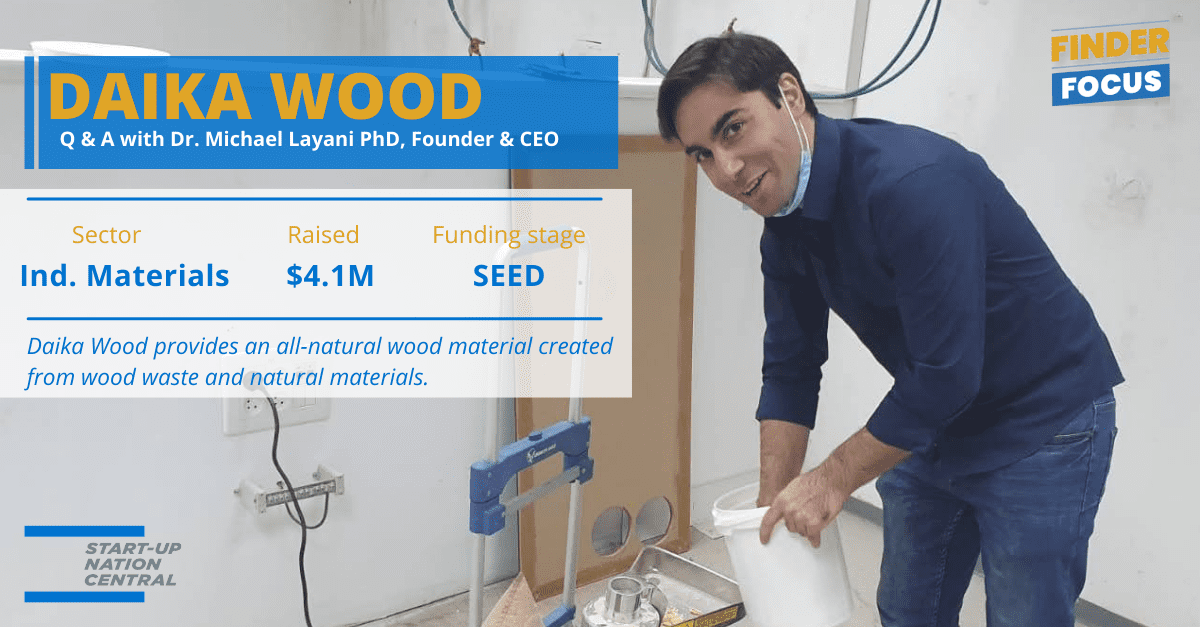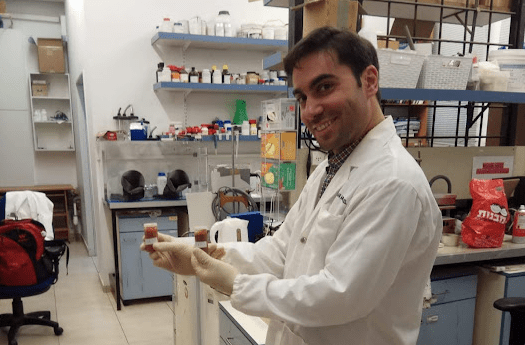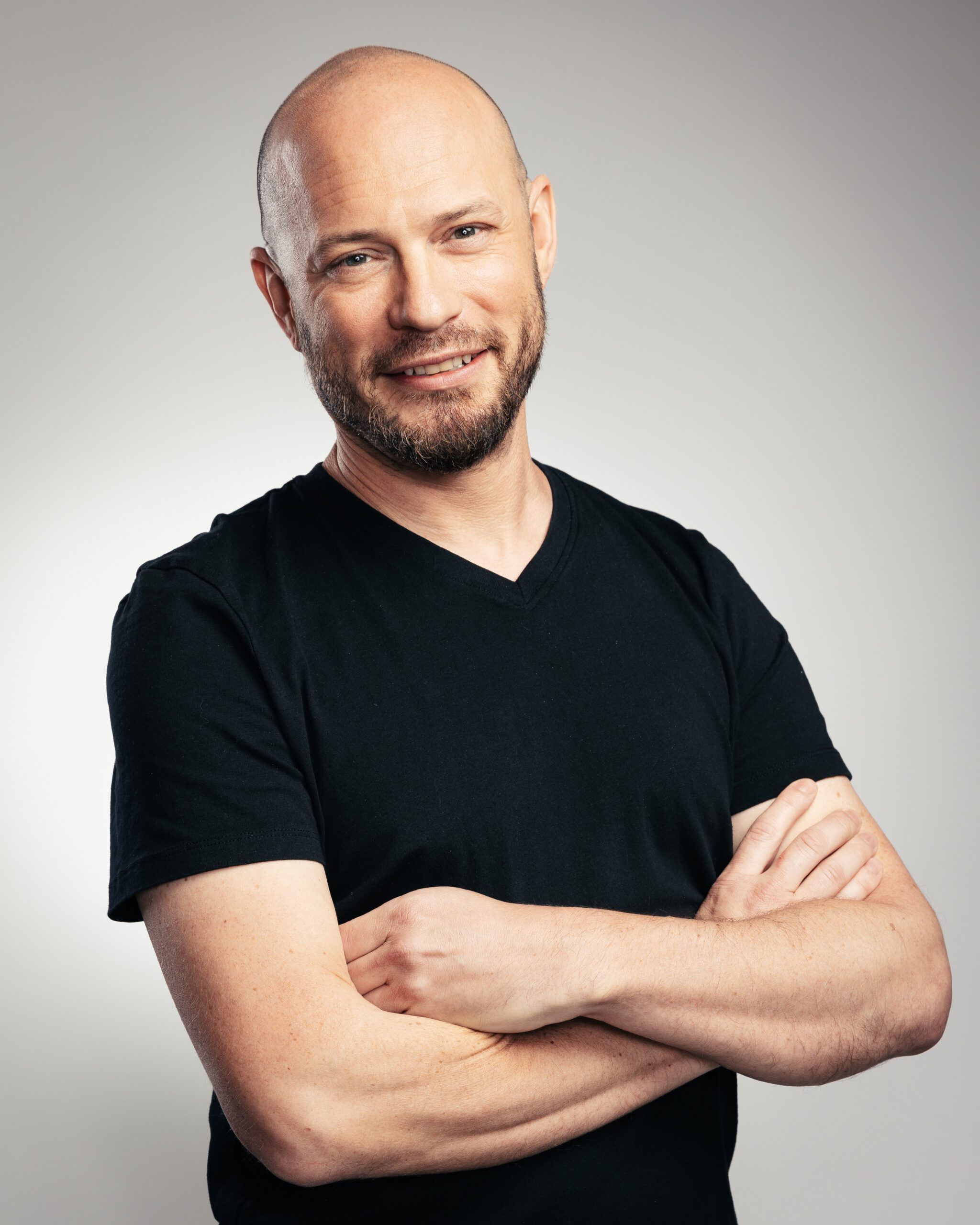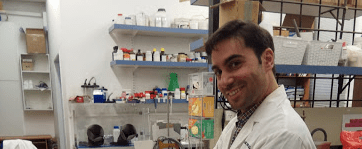Daika Wood has developed a new, all-natural wood material created using existing industrial mass-manufacturing processes.

“The vast majority of products that are marketed as sustainable are still plastic. Not sustainable in any way.”
Start-Up Nation Central: Tell us about Daika Wood, the problems you solve, and your solution.
Michael Layani: Daika Wood is a materials company. What we aim to do is to give the manufacturing industries a new material that allows mass manufacturing of a 100% natural product. Currently, in these industries, there is an intention to produce something sustainable. However, the materials made are plastic. So they aren’t actually as sustainable as they purport to be. What we offer is the same freedom of design that plastics give with the additional guarantee that the product is 100% natural.
Daika Wood is also trying to help solve the wood waste problem. The material that we are offering utilizes massive amounts of wood waste that comes from municipal, agricultural, and industrial waste that isn’t put into any circular solution. So we are offering a new raw material that has a wide range of applications and designs with the ability to be 100% natural.
Start-Up Nation Central: Are you saying that there are materials out there that purport to be natural but actually are not?
Layani: The vast majority of products that are marketed as “sustainable” are still plastic. That seems confusing, doesn’t it? There are two reasons that they are able to be labeled as “sustainable”:
Firstly, it is possible to manufacture plastic from raw materials, called bioplastics. PLA is one such plastic. However, even if they are used with raw or natural materials, their inability to degrade and the way they are processed are still identical to plastic. So there is no meaningful reduction in the environmental impact.
The second way to claim “sustainability” is by producing plastics combined with some organic material. For example, they may take wood waste and combine it with plastic. This is also problematic because the consumer will still receive plastic that isn’t recyclable. The only sustainable selling point of plastic is that it is reusable, but these materials cannot be recycled because they are only partially plastic. So, again, not really sustainable.
So what we are doing here at Daika is twofold in response to this issue: we are not using petroleum-based materials at all, and we are completely recyclable.

One thing we really committed to here at Daika was that we would not use any petroleum-based products, and that’s a really big deal. Consumers are unaware that the materials they are using that are marketed as sustainable are really anything but.
Start-Up Nation Central: Do you think consumers realize that the products they may be using are actually not as sustainable as they have been led to believe?
Layani: Well no, but they might be able to come to that conclusion on their own due to two factors, one is price. Regulators are increasing the fines and carbon credits that these manufacturers need to pay based on their emissions. This is one way that consumers will be able to know that what they are using is pure plastic. Also, there is a difference in the tactile sensation of wood and plastic. Our customers will know just by touching it that what they are feeling is not plastic, but an organic material. And at Daika, all our products are made with wood.
Start-Up Nation Central: Could you talk about the wood waste problem you mentioned that Daika is solving?
Layani: Of course. The wood waste problem is in agriculture, municipal, and industrial waste. Out of these three, agricultural waste is the most challenging. Take wheat. Most of it is thrown away and not utilized. This also exists for corn and many other agricultural food products. The issue with recovering these wasted bits of wheat or corn is that they are disposed of over large geographical areas, and it varies throughout the year. It would be great if we were to connect with conglomerates at Daika because then we would have a consistent base to use this raw material that is being wasted and not recycled in any way. But in general, agriculture is the most challenging.
For industrial wood waste, we target sawmills and large factories that are creating large amounts of wood waste streams that are not being used in a circular economy. We are using this relationship to recover raw materials that can be used in the Daika process to create new products in these mass manufacturing industries like furniture.
In the municipal sector, the amount of waste created is increasing as the population grows, and there has really been no solution pushed forward to alleviate this issue. Typically the municipalities need to pay a lot of money to dispose of their wood waste. We are working with large wood conglomerates in Europe, one Swedish and one Finnish. And we know that they produce tens of thousands of tons per year of these waste streams that they don’t know what to do with when a company like ours can actually use it. So Daika Wood is working to establish contacts and build relationships with companies that really need to dispose of something that we can use.
Start-Up Nation Central: When did you first realize this was such a big problem and how did you come to dedicate your life to this?

“I have always had an affinity for natural wood.”
Layani: I got my PhD in chemistry. After that, I became a researcher at the Hebrew University. As a side note, I have always had an affinity for natural wood. Everyone can tell there is a natural warmth and feel to wood, and I’ve always connected with it personally. We were working on a project regarding 3D printing in a different context and were developing materials to use, and as I was holding the samples that we were using in the project, it occurred to me that we weren’t using completely raw natural materials and that we would be able to solve these waste stream dilemmas by upcycling what was being tossed away.
When I realized we could solve two problems at once, this is how I became very motivated to see this project to fruition. But it was challenging. I had to decide to let go of my academic career and fully establish Daika on my own.
Start-Up Nation Central: Interesting. So what drove you to take leadership of this whole enterprise?
Layani: I saw the whole picture and had the vision of how it could be, even with just the small samples in my hand. In the beginning, it was harder for other people to see how the enterprise would pan out. I also knew that if I didn’t do it, then no one else might. And I am really happy that I made that choice: there is a huge necessity for this work in the industry and we are getting great feedback from our partners.
Start-Up Nation Central: What have been some challenges since then?
Layani: Well, we wanted this company to look attractive to the industry. So we worked hard to show that the price was attractive and that the project itself was feasible. Overcoming this hurdle got us connected to a very important investor who saw an overlap with one of his companies, which takes household trash and turns it into plastic. With this connection, we got enough money to start moving forward very rapidly and at much larger scale. Nowadays, we are working with Steelcase in Munich so they can open a Daika facility for their wood waste. This is allowing Daika to potentially have a footprint in the US market, a fact we are very proud of. Other collaborations – still confidential- are also in the works in Michigan.
Start-Up Nation Central: What does success look like for you?
Layani: Lots of different projects with companies that mass manufacture their products. Where we are able to utilize massive amounts of waste streams and create large volumes of our product. That would definitely check the box of success for me. This would show that Daika isn’t just a startup with a good idea, but that our product works as intended and stands on its own.
Start-Up Nation Central: What is standing in the way of success at this point? What do you need more of?
Layani: We definitely need funding to establish the next manufacturing lines. We do have investors lined up for this but it is a process. We also need strategic partners to be able to establish mass manufacturing for our product so it can be used widely.
Start-Up Nation Central What would you want Daika to be world-famous for?
Layani: I want Daika to be the immediate association when anyone considers wood waste. For instance, someone would see furniture on their block and would say to themselves, “This can be used through the Daika process to be made into other furniture, wood flooring, etc.” I would love to see that happen. It’s now my life’s work.
Start-Up Nation Central: What do you think investors and corporations need to know about Israel?
Layani: One word: Chutzpah. We see one challenge and we charge at it. We are always going toward the future.
Start-Up Nation Central: Do you have any recommendations for people when they come to visit Israel?
Layani: I want to think of something outside of the box to recommend…the crater of Makhtesh Ramon in the Negev. This is not a place that a lot of visitors go to and it is really an impressive sight. You can also check out all the farms that were created in the desert thanks to Israeli ingenuity.

Phillip Stark is the Marketing Manager for Start-Up Nation Finder at Start-Up Nation Central. Finder is provided courtesy of Start-Up Nation Central, a non-profit organization that strengthens Israel’s innovation ecosystem and connects it to global challenges and stakeholders.
